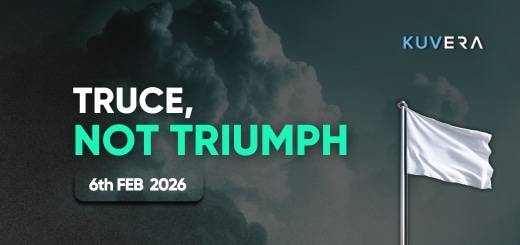In this edition, we talk about the battle between Chinese and American companies for supremacy in artificial intelligence. We also talk about the legal challenge to OpenAI in India, the RBI’s liquidity-boosting measures and DLF’s record-breaking real estate project.
Welcome to Kuvera’s weekly digest on the most critical developments related to business, finance, and the markets.
tl;dr Hear the article in brief instead?

By the time this edition of the newsletter lands in your inbox on Saturday morning you would perhaps be sipping a cup of coffee and getting ready to watch the finance minister Nirmala Sitharaman deliver yet another budget speech.
And if you find it difficult to focus on all the big budget numbers and jargons before she comes to the part that really bothers most—taxes—and if you begin to wonder why the cup of coffee in your hand has turned pricier or why the 100-gram pack of coffee powder has shrunk to 90-gram, we won’t blame you. That’s because you are right.
Global coffee prices have nearly doubled over the past year to record highs due to tight supplies from top exporters Brazil and Vietnam. And prices could climb further this year, both in India and internationally.
Coffee, however, didn’t make the front-page headlines this week. Nor did the budget, by the way. And since you will read all about the budget tomorrow and the day after, let us quickly turn to what really made top news this week.
That takes us to Hangzhou, the Chinese city that the great 13th-century European traveler Marco Polo described as the finest and noblest in the world.
Hangzhou gained worldwide fame this week when a local startup led by entrepreneur Liang Wenfeng shook the global tech giants. DeepSeek, the startup, launched artificial intelligence models V3 and R1 that it claims are on a par with or better than top models of American companies such as Microsoft-backed OpenAI and Facebook parent Meta Platforms.
DeepSeek received a spectacular response within days. It became the top-rated free app on Apple’s App Store in the US. OpenAI CEO Sam Altman and Silicon Valley venture capitalist Marc Andreessen called DeepSeek’s R1 model “impressive”. Even US President Donald Trump admitted that the release of DeepSeek should be “a wakeup call” for US companies.
The bigger shock was that the Chinese startup claimed it trained its DeepSeek-V3 AI model with just $6 million using Nvidia’s less-advanced H800 chips. Although critics say the startup didn’t disclose the total amount it invested, this is a tiny fraction of the billions and billions of dollars that American companies are pouring into AI technologies.
Microsoft, for instance, is spending $80 billion on AI this year. Meta has vowed to invest $65 billion. Trump this month announced the Stargate joint venture by Oracle, OpenAI and SoftBank that would invest $500 billion in AI.
It was OpenAI’s release of ChatGPT in late 2022 that had kicked off the AI frenzy worldwide, pushing stocks of tech companies sharply higher. Nvidia’s shares, for instance, doubled last year and pushed its market cap north of $3.5 trillion. Nvidia also bore the brunt of DeepSeek’s emergence with its market value plunging nearly $600 billion in a single day.
DeepSeek was followed days later by Alibaba. The Chinese tech and ecommerce behemoth released a new version of its Qwen 2.5 AI model and claimed it surpassed the DeepSeek-V3, OpenAI’s GPT-4o and Meta’s Llama-3.1-405B AI models. TikTok owner ByteDance also released an update to its AI model and claimed it outperformed OpenAI’s o1 in some tests.
There is little doubt that American companies, led by the Magnificent Seven—Microsoft, Google, Meta, Amazon, Apple, Nvidia, and Tesla—will fight to retain their perceived lead in the global AI race. There is also little doubt that Chinese companies are fast catching up. And if you are wondering where is India in this race? Well, we are just waking up!
Copy it Right
OpenAI isn’t just facing a challenge in its home turf; it is also facing the heat in India. But not from any AI rival. Instead, the ChatGPT owner is fighting a legal challenge by news agency ANI, book publishers and media organisations.
While ANI filed a copyright lawsuit against OpenAI last year, several book publishers and their international counterparts, as well as newspapers and news websites are seeking to join the court case.
The Federation of Indian Publishers, whose members include Rupa Publications, S.Chand and Co, Penguin Random House, Bloomsbury and Cambridge University Press, has filed a case against OpenAI in the Delhi High Court. Digital units of The Indian Express, Hindustan Times as well as Reliance Industries and Adani groups also intend to join the lawsuit.
These publishers and media companies argue that ChatGPT scraped content from their websites to reproduce their work and even lifted book summaries or extracts from unlicensed online copies.
To be sure, India isn’t the only country where OpenAI and other AI companies are facing copyright lawsuits. But India is important for the world’s biggest AI firm as it is the company’s No. 2 market by number of users after the US.
OpenAI has denied the allegations of copyright infringement, saying it only uses information that’s publicly available. It is also trying to block media companies and publishers from joining the lawsuit, and says Indian courts can’t hear a case against the company because its servers are located in other countries.
The high court will hear the case next month, and it promises to be a high-octane battle. Stay tuned!
Cash Concerns
Moving on from the exciting world of technology to the more mundane world of finance, the central banks of several countries were in action this week.
In India, the Reserve Bank of India rolled out several steps to inject liquidity into the banking system to ease a severe cash crunch that had pushed short-term lending rates higher.
The RBI said it will buy government bonds worth Rs 60,000 crore in three tranches, conduct a dollar-rupee buy/sell swap auction of $5 billion on Jan. 31, and conduct a 56-day variable rate repo auction worth Rs 50,000 crore on Feb. 7.
The liquidity deficit widened to a multi-year high of Rs 3 trillion this week due to slow government spending, foreign investor outflows and the RBI’s interventions in the forex market. But the three measures the RBI announced will inject almost Rs 1.5 trillion into the banking system. This will not only help banks to boost lending but also ease pressure on the rupee, which has been trending near record lows against the dollar.
Moreover, it indicates that the RBI is set to cut interest rates at its policy meeting on Feb. 7. But the RBI’s rate-setting decision became a little more complicated after the US Federal Reserve this week decided to keep its benchmark rate unchanged.
The Fed had cut rates thrice by a total one percentage points since September but Fed Chair Jerome Powell held back this time in the wake of strong GDP growth and relatively low inflation even as he awaits more clarity on President Donald Trump’s tariff policies that can stoke price pressures in the US. The Fed’s decision, meanwhile, didn’t stop the European Central Bank and the Bank of Canada from cutting rates.
It’s Real, Really!
While the banking system is dealing with a cash crunch, India’s real estate sector shows no such problem. At least if DLF Ltd’s latest project in Gurgaon is any indication.
India’s biggest real estate developer said this week it sold 173 apartments at its The Dahlias project for an astounding total of Rs 11,816 crore. For those without calculators at their disposal, that’s roughly Rs 68 crore for one apartment on average. Not all apartments carried the same price tag, of course, and two penthouses went for Rs 150 crore each.
DLF will take more than four years to build the ultra-luxury project that will have cascading lakes, indoor sports facilities, cinemas, and even on-call chefs for its ultra-elite residents.
The company is not done, though. The Dahlias will have 420 apartments, which means DLF still have 247 units to sell. The company said it will sell these units in a phased manner and expects to rake in a total of Rs 23,000 crore. That would mean Rs 93 crore on average.
At this price, frankly, you can buy an apartment anywhere in the world. Even in Dubai’s Burj Khalifa, the world’s tallest building.
Still, if you want an address in India’s most expensive real estate project, and have some pocket change of a few hundred crores lying around, go for it.
If only the RBI could tap into this massive lake of liquidity to fill the banking bucket!
Market Wrap
India’s benchmark stock market indices began the week with a loss after DeepSeek shocked US tech companies but then gained for the remaining four days to end the week higher. The BSE Sensex climbed 1.7% while the NSE Nifty rose 1.8% this week. However, stock markets will remain open on Saturday because of the budget.
State-run Bharat Electronics was the top gainer of the week. Bike and carmakers mostly ended higher, led by Hero MotoCorp, Mahindra & Mahindra and Bajaj Auto. Bajaj Finance was the biggest gainer among financial stocks, which benefited from the RBI’s liquidity measures. IndusInd Bank, Axis Bank, SBI and ICICI Bank also closed in the green. Other gainers included Cipla, Trent, Nestle, Hindustan Unilever, and Tata Steel.
Sun Pharma was the top loser this week. IT companies Tech Mahindra, Wipro, HCL Technologies and TCS all ended in the red. Tata Motors, Adani Enterprises and Hindalco were among the other stocks that slipped this week.
Earnings Snapshot
- Tata Steel Q3 consolidated net profit drops 36% to Rs 327 crore, beats predictions of a loss
- JSW Energy consolidated net profit slumps 27.5% year on year to Rs 168 crore
- JSW Infrastructure posts Q3 consolidated net profit of Rs 330 crore, misses forecasts
- ICICI Bank’s standalone net profit climbs 14.8% to Rs 11,792 crore, beats estimates
- Tata Motors Q3 profit falls to Rs 5,451 crore from Rs 7,025 crore, misses estimates
- Maruti Suzuki standalone profit rises 12.6% year-on-year to Rs 3,525 crore, lags forecasts
- Hyundai India Q3 revenue slips 1.3%, profit skids 19% to Rs 1,161 crore
- Bajaj Auto profit rises 3.3% to Rs 2,109 crore, lags analysts’ expectations
- TVS Motor profit rises 4% to Rs 618 crore, misses estimates
- State-run BHEL swings to net profit of Rs 125 crore from year-ago loss of Rs 213 crore
- State-run Coal India’s consolidated net profit drops 17% to Rs 8,506 crore
- SBI Cards misses forecasts as profit drops 30% to Rs 383 crore
- Cipla consolidated net profit jumps 49% to Rs 1,571 crore, tops analysts’ estimate
- Hindustan Zinc consolidated net profit surges 32% to Rs 2,678 crore, beats forecasts
- Bajaj Housing Finance profit jumps 25% year on year to Rs 548 crore
- Adani Total Gas consolidated profit falls 20% year on year to Rs 142 crore
- Adani Enterprises consolidated net profit slumps to Rs 57.83 crore from Rs 1,888 crore
- Adani Ports consolidated net profit jumps 14% to Rs 2,520 crore
- Bajaj Finance consolidated net profit climbs 18% to Rs 4,308 crore
Other Headlines
- Economic Survey projects GDP growth at 6.3-6.8% in 2025-26
- Govt invites applications for new SEBI chief as Madhabi Puri Buch’s term ends on Feb 28
- JSW Group forays into copper business, to invest Rs 2,600 crore at two mines in Jharkhand
- RBI supersedes board of Aviom India Housing Finance, to begin bankruptcy process
- RBI asks banks to tighten cybersecurity oversight to prevent digital fraud
- ITC Hotels makes stock-exchange debut after demerger from ITC
- Fintech startup Cred joins RBI’s digital currency project
- Sri Lanka govt says discussions on with Adani Group to cut wind energy purchase cost
- Tax authorities conduct searches at IIFL Finance, 360 ONE WAM, IIFL Securities
- Whirlpool Corp says to cut stake in India unit to about 20% from 51% currently
- Govt approves Rs 16,300 crore to develop critical minerals sector
That’s all for this week. Until next week, happy investing!
Interested in how we think about the markets?
Read more: Zen And The Art Of Investing
Watch here: Investing in International Markets
Start investing through a platform that brings goal planning and investing to your fingertips. Visit kuvera.in to discover Direct Plans and Fixed Deposits and start investing today. #MutualFundSahiHai #KuveraSabseSahiHai












